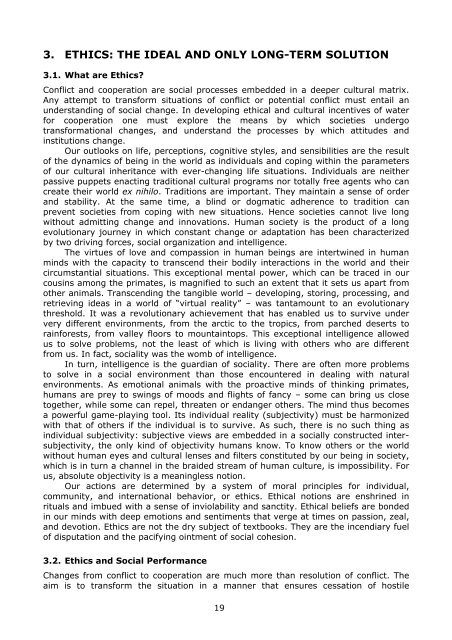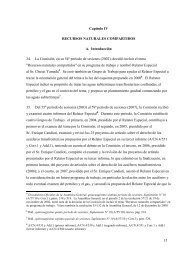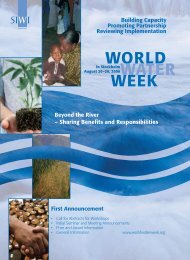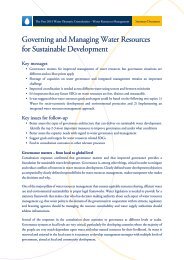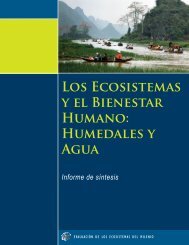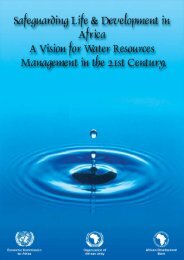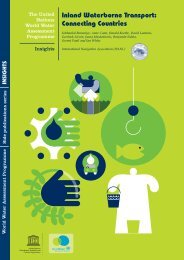Water security and peace: a synthesis of studies ... - unesdoc - Unesco
Water security and peace: a synthesis of studies ... - unesdoc - Unesco
Water security and peace: a synthesis of studies ... - unesdoc - Unesco
Create successful ePaper yourself
Turn your PDF publications into a flip-book with our unique Google optimized e-Paper software.
3. ETHICS: THE IDEAL AND ONLY LONG-TERM SOLUTION<br />
3.1. What are Ethics?<br />
Conflict <strong>and</strong> cooperation are social processes embedded in a deeper cultural matrix.<br />
Any attempt to transform situations <strong>of</strong> conflict or potential conflict must entail an<br />
underst<strong>and</strong>ing <strong>of</strong> social change. In developing ethical <strong>and</strong> cultural incentives <strong>of</strong> water<br />
for cooperation one must explore the means by which societies undergo<br />
transformational changes, <strong>and</strong> underst<strong>and</strong> the processes by which attitudes <strong>and</strong><br />
institutions change.<br />
Our outlooks on life, perceptions, cognitive styles, <strong>and</strong> sensibilities are the result<br />
<strong>of</strong> the dynamics <strong>of</strong> being in the world as individuals <strong>and</strong> coping within the parameters<br />
<strong>of</strong> our cultural inheritance with ever-changing life situations. Individuals are neither<br />
passive puppets enacting traditional cultural programs nor totally free agents who can<br />
create their world ex nihilo. Traditions are important. They maintain a sense <strong>of</strong> order<br />
<strong>and</strong> stability. At the same time, a blind or dogmatic adherence to tradition can<br />
prevent societies from coping with new situations. Hence societies cannot live long<br />
without admitting change <strong>and</strong> innovations. Human society is the product <strong>of</strong> a long<br />
evolutionary journey in which constant change or adaptation has been characterized<br />
by two driving forces, social organization <strong>and</strong> intelligence.<br />
The virtues <strong>of</strong> love <strong>and</strong> compassion in human beings are intertwined in human<br />
minds with the capacity to transcend their bodily interactions in the world <strong>and</strong> their<br />
circumstantial situations. This exceptional mental power, which can be traced in our<br />
cousins among the primates, is magnified to such an extent that it sets us apart from<br />
other animals. Transcending the tangible world – developing, storing, processing, <strong>and</strong><br />
retrieving ideas in a world <strong>of</strong> “virtual reality” – was tantamount to an evolutionary<br />
threshold. It was a revolutionary achievement that has enabled us to survive under<br />
very different environments, from the arctic to the tropics, from parched deserts to<br />
rainforests, from valley floors to mountaintops. This exceptional intelligence allowed<br />
us to solve problems, not the least <strong>of</strong> which is living with others who are different<br />
from us. In fact, sociality was the womb <strong>of</strong> intelligence.<br />
In turn, intelligence is the guardian <strong>of</strong> sociality. There are <strong>of</strong>ten more problems<br />
to solve in a social environment than those encountered in dealing with natural<br />
environments. As emotional animals with the proactive minds <strong>of</strong> thinking primates,<br />
humans are prey to swings <strong>of</strong> moods <strong>and</strong> flights <strong>of</strong> fancy – some can bring us close<br />
together, while some can repel, threaten or endanger others. The mind thus becomes<br />
a powerful game-playing tool. Its individual reality (subjectivity) must be harmonized<br />
with that <strong>of</strong> others if the individual is to survive. As such, there is no such thing as<br />
individual subjectivity: subjective views are embedded in a socially constructed intersubjectivity,<br />
the only kind <strong>of</strong> objectivity humans know. To know others or the world<br />
without human eyes <strong>and</strong> cultural lenses <strong>and</strong> filters constituted by our being in society,<br />
which is in turn a channel in the braided stream <strong>of</strong> human culture, is impossibility. For<br />
us, absolute objectivity is a meaningless notion.<br />
Our actions are determined by a system <strong>of</strong> moral principles for individual,<br />
community, <strong>and</strong> international behavior, or ethics. Ethical notions are enshrined in<br />
rituals <strong>and</strong> imbued with a sense <strong>of</strong> inviolability <strong>and</strong> sanctity. Ethical beliefs are bonded<br />
in our minds with deep emotions <strong>and</strong> sentiments that verge at times on passion, zeal,<br />
<strong>and</strong> devotion. Ethics are not the dry subject <strong>of</strong> textbooks. They are the incendiary fuel<br />
<strong>of</strong> disputation <strong>and</strong> the pacifying ointment <strong>of</strong> social cohesion.<br />
3.2. Ethics <strong>and</strong> Social Performance<br />
Changes from conflict to cooperation are much more than resolution <strong>of</strong> conflict. The<br />
aim is to transform the situation in a manner that ensures cessation <strong>of</strong> hostile<br />
19


